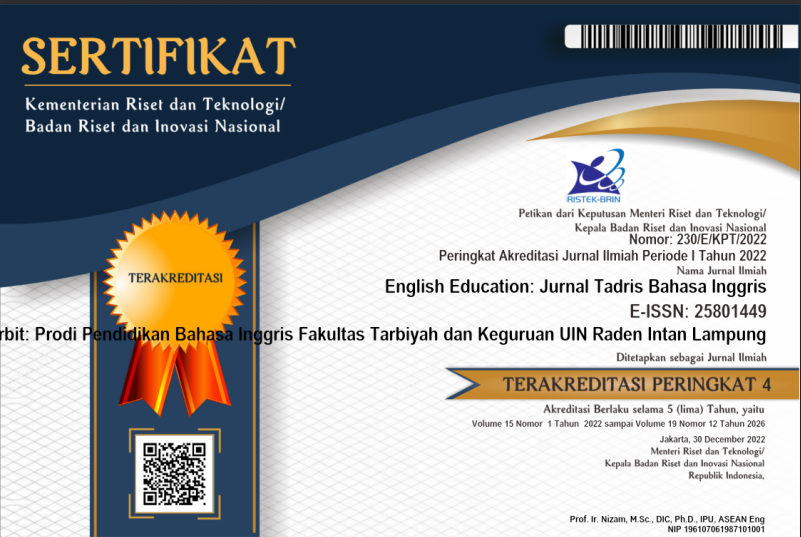A Study on The Distinction between Extrovert Vs Introvert in Learning English
Abstract
This paper aims to examine the differences abilities between extrovert and introvert personality in learning English. This study describes the differences in the ability of speaking, writing, listening and reading. The approach used in this study is a qualitative approach. Data were obtained by conducting observations and interviews with research subjects. The subjects of this study were students of the third semester of English Education at IAIN Pekalongan. The analysis in this study uses a descriptive analysis related to the differences in English skills in extroverts and introverts. The results showed that the differences between extroverted and introverted personalities on the ability to learn English. In speaking skills, extroverted students are more mastery than introverted students. While writing, listening, and reading skills introverted students are more mastered. But in the aspect of pronunciation & accent, extroverts' vocabulary and fluency are superior than introverts. Introverts good in grammar, and comprehension. On the other hand, introverts have superior writing skills in terms of vocabulary, content, and expression. whereas extroverts only excel in terms of content and expression. The spelling and grammar is not influenced by the personality.Therefore each personality have own skills or advantages and disadvantages.
Full Text:
PDFReferences
Angeline, Felicia, Biomedical, and Engineering Departement. 2020. The Number One Language, English: The Aspects of Learning English and Its Difficulties.
Diana, Laksmi. 2018. “HAMBATAN PEMBELAJARAN BAHASA INGGRIS MAHASISWA FAKULTAS PERTANIAN UNIVERSITAS PEMBANGUNAN NASIONAL VETERAN JAWA TIMUR.” Berkala Ilmiah AGRIDEVINA 7(1):93–101. doi: 10.33005/adv.v7i1.1133.
Haryanto, Dadang, and Ilham Muhamad Nur. 2017. “SISTEM PAKAR TES KEPRIBADIAN EKSTROVERT DAN INTROVERT DENGAN METODE FORWARD CHAINING.” JUTEKIN (Jurnal Teknik Informatika) 5(2). doi: 10.51530/jutekin.v5i2.138.
Husain, Balqis, and Ibrahim Ibrahim. 2019. “Perbedaan Prestasi Belajar Bahasa Inggris Siswa Ditinjau Dari Tipe Kepribadian Introvert Dan Extrovert.” Qalam : Jurnal Ilmu Kependidikan 7(2):91–106. doi: 10.33506/jq.v7i2.371.
Noprianto, Eko. 2018. “Extrovert versus Introvert Students: What EFL Learning Strategy Do They Use?” ASIAN TEFL 2:119–35. doi: 10.21462/asiantefl.v2i2.34.
Razawi, Nurul Amilin. n.d. “STUDENTS’ DIVERSE LEARNING STYLES IN LEARNING ENGLISH AS A SECOND LANGUAGE.” 2(19):8.
Samand, Sri Muniarty, Zalili Sailan, and Asrun Lio. 2019. “Analysis On The Relationship Of Extrovert-Introvert Personality And Students’ Speaking Performance In English Study Program Of Halu Oleo University.” Journal of Language Education and Educational Technology (JLEET) 4(1). doi: 10.33772/jleet.v4i1.6677.
Shehni, Maryam Cheraghi, and Tahereh Khezrab. 2020. “Review of Literature on Learners’ Personality in Language Learning: Focusing on Extrovert and Introvert Learners.” Theory and Practice in Language Studies 10(11):1478–83. doi: 10.17507/tpls.1011.20.
Susanthi, I. Gusti Ayu Agung Dian. 2021. “Kendala Dalam Belajar Bahasa Inggris Dan Cara Mengatasinya.” Linguistic Community Services Journal 1(2):64–70. doi: 10.22225/licosjournal.v1i2.2658.
Sutrisno, Bejo, Yumna Rasyid, and Aceng Rahmat. 2018. “THE EFFECT OF COOPERATIVE LANGUAGE LEARNING AND PERSONALITY TYPES TOWARDS ESSAY WRITING.” English Review: Journal of English Education 6(2):95–104. doi: 10.25134/erjee.v6i2.1259.
Travolta, Yessi, Mulyadi, and Imranuddin. 2018. “A COMPARATIVE STUDY ON INTROVERT AND EXTROVERT STUDENTS PERSONALITY IN ENGLISH LISTENING SCORES.” Journal of English Education and Teaching 2(2):9–19. doi: 10.33369/jeet.2.2.9-19.
DOI: http://dx.doi.org/10.24042/ee-jtbi.v14i2.9140
License URL: https://creativecommons.org/licenses/by-sa/4.0
English Education: Jurnal Tadris Bahasa Inggris, UIN Raden Intan Lampung is licensed under a Creative Commons Attribution-ShareAlike 4.0 International License. pISSN: 2083-6003, eISSN: 2580-1449.









